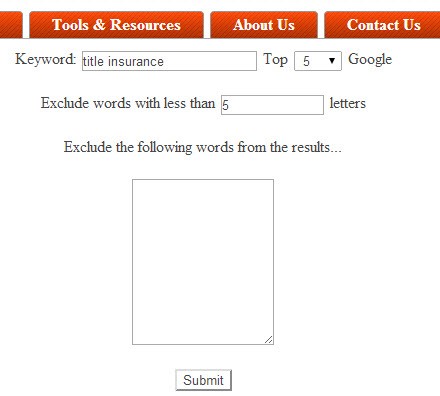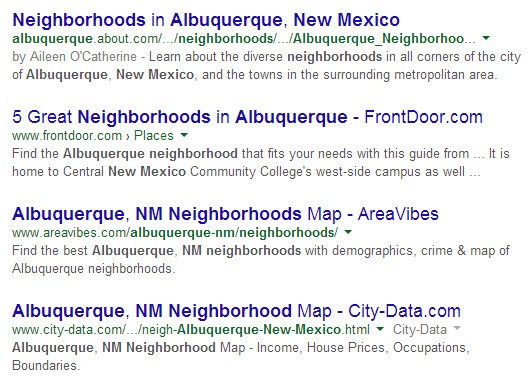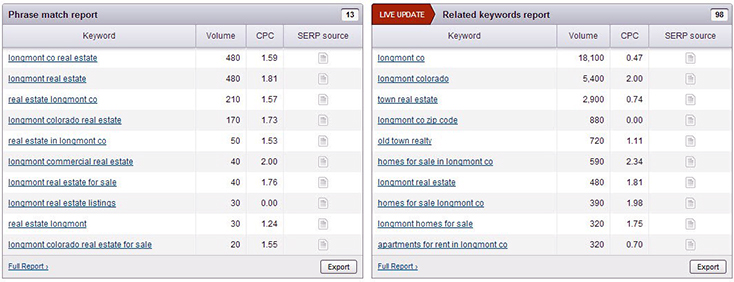You are viewing our site as an Agent, Switch Your View:
Agent | Broker Reset Filters to Default Back to ListTop 10 SEO Strategies & Tips for Realtors®
September 18 2014
 SEO, Search Engine Optimization, can make a big difference between whether your website is just a billboard people surf past or a destination that delivers leads and commissions. A Google search on "SEO" yields 216,000,000 results as we write this. If you limit it to "real estate SEO," you still get 40,000,000 results. Yes, that's 40 million.
SEO, Search Engine Optimization, can make a big difference between whether your website is just a billboard people surf past or a destination that delivers leads and commissions. A Google search on "SEO" yields 216,000,000 results as we write this. If you limit it to "real estate SEO," you still get 40,000,000 results. Yes, that's 40 million.
You can see that there is no shortage of articles and information about search engine optimization, and many are written by self-described "gurus." Also, if you look at the dates on them, there is a lot of very old information out there. What does "old" mean when we're talking about SEO? For Google, with hundreds of minor and many major algorithm updates each year, "old" can mean only weeks in some cases.
You can view a history by year of updates over at Moz.com, and it's a long list. Many aren't major nor do they have names. Others like Panda and Penguin, are major and have themselves gone through multiple updates. What's the point? It's simply that SEO is a moving target, and this report begins with this information because it's important. We have done extensive research of newer material and SEO information, and the strategies and tips here are the latest and most reliable out there.
We've also taken care to give you strategies that are more "evergreen," or expected to be in the future. The term "evergreen" comes from the news and publishing industry and refers to material that is not "dated." It is expected to be relevant for a long time or forever. As you go through this material, you'll see that we've concentrated on Google's goals and how these strategies help Google to achieve them.
By concentrating on what Google wants, we can share information that is relevant, timely, and expected to be useful for some time to come. Google has come a long way in lowering reliance on things like keyword density, which led to keyword "stuffing" and low quality content getting higher positions in search.
The good news is that it will take you longer to read this material than it will to apply it to each of your website content pieces on average. These tips are all related to a master SEO strategy geared toward making Google happy ... and that will make you very happy as well.
Strategy #1 – SEO doesn't mean "Search Engine OBSESSION!"
This is a short tip, but very important to your website's success. If you become obsessed with SEO, you'll likely end up:
- Spending way too much time implementing marginal SEO tactics, and you'll have far less time to conduct your business and serve your clients ... OR
- You'll get into trouble with Google doing things that can hurt more than they help ... OR
- You'll end up giving up because SEO becomes a burden.
What you want to avoid at all costs are Google penalties for SEO tactics. Here's an excerpt from and link to an article at SearchEngineLand.com:
Lawyers Sue SEO Firm For Violating Google Guidelines
May 26, 2014 at 3:56pm ET by Greg Sterling
A law firm in Michigan, Seikaly & Stewart, is suing its former SEO provider -- but not for a lack of ranking success. Rather, the firm is getting sued for allegedly using "spammy" techniques violating Google's guidelines. That comes via Eric Goldman. The defendant Rainmaker Institute, which specializes in online marketing services for the legal profession, is accused of knowingly violating Google SEO guidelines by building "link farms" on behalf of the plaintiff's several legal domains. It's not clear from the complaint (also embedded below) whether the plaintiff law firm suffered a [...]
We can have a little laugh that it's a law firm feeling burned by bad SEO tactics, but we certainly don't want to be in their shoes as we don't have the money to sue. The strategies and tips in this article are not going to get you into trouble, and they'll not take up so much time that you'll quit using them.
Strategy #2 – The whole keyword thing has changed ... a lot.
There are still articles and even websites teaching "keyword density," and allowing you to check the keyword density of a page or article. That's a percentage number representing how many times the targeted keyword or phrase shows up in the content compared to total words. To make it simple: FORGET IT.
Yes, we still want to select one or two key phrases (single words are just too broad for good results) and work them into our articles/posts. The best places to make sure they're in the content are:
- In the page title and URL.
- Used in the Meta Description.
- Used near the beginning and near the end of the article, preferably in first and last sentence.
Try to use as sub-headings using H1, H2, H3, etc. heading tags, or bold and italic text.
You don't have to get complicated. Just start doing this and it will become second nature. It will improve your SEO results.
Strategy #3 – Start thinking LSI, Latent Semantic Indexing
This is a big one. Google uses LSI to relate words and phrases around subject matter. To illustrate, here's the search form at LSIKeywords.com:

We've entered "title insurance" to see what Google is considering as related words and phrases. You no longer have to use the same keyword/phrase over and over, because Google is learning other phrases that carry weight because they're related. Here is a portion of the result for this search:
Particularly for the two word and three word phrases, you can see other word combinations you can use to rank related to "title insurance." The site also gives you links to the top results for "title insurance":

You're beginning to see that we're moving from just repeating words over and over to creating content around a subject that will be of value to our visitors, but also will be rewarded by Google.
Strategy #4 – Expertise, Authoritativeness or Trustworthiness
Again from over at SearchEngineLand.com:
Google's Quality Rating Guide Leaked Again; Here Is Version Five
Jul 14, 2014 at 2:23pm ET by Barry Schwartz
Jennifer explained the new guidelines put "a high emphasis on sites that are considered to have a high level of expertise, authoritativeness or trustworthiness." This is known as the acronym, EAT: expertise, [...]
This strategy wraps around a lot of the others we're giving you. Google wants searchers to find experts, trustworthy authorities on the topics of the search. Write about all things related not just to local real estate, but to real estate as a major topic. Use LSI to include what we know Google will recognize as related keywords and phrases. BE THE EXPERT in your local market.
Strategy #5 – Local and conversational search are important.
Blame the dramatic rise in smart phone use, as we now must consider not just local keywords and phrases, but also "contextual" or "conversational" search as important. Google is getting much better at interpreting searches like "Where is the closest Topeka real estate office?" Yes, people are searching with conversational text and questions. That's because they can speak instead of type the search. You can also search by voice using Chrome and maybe other browsers.
An example we used was the voice request: "What are the most popular Albuquerque New Mexico neighborhoods?" Here are some of the top results:

A sharp Albuquerque real estate agent would write a couple of articles featuring "the most popular Albuquerque neighborhoods." It's likely that they could jump to the top of these results, especially if the search is done on a smart phone with location tracking turned on. Google could give preference to more local results.
Google has discontinued the open use of their Keyword Research Tool. Now you have to sign up for Adwords to use it. However, it may be worth it to research what keywords and phrases are being used a lot in your area. Another free tool with a few limitations is over at SEMRush.com.

To get to these type of results, in this case for the phrase "Longmont CO real estate," you need to type into your browser URL bar: http://semrush.com/info/**************. In place of the asterisks, type in the words of the search with "+" between them. In our example, it looks like this: http://www.semrush.com/info/longmont+co+real+estate. Clicking on that link will take you to the results.
Strategy #6 – Linking is still a priority.
We're talking about outgoing links, incoming links to your site, and internal linking to other areas of your site. They're all important. One of the greatest values of the Internet is the way that linking can take a user to relevant information quickly with a simple mouse click or tap on a screen.
Incoming: The old "PageRank" measurement is really of little concern these days. However, the basis of that strategy is still valid. The more links into your site from relevant and high quality sites the better.
Outgoing: While we all hate to send someone off our site, people today know how to get back easily. They and the search engines will value links you provide to relevant and helpful information.
Internal Linking: Any help you can give a user to locate other content on topic is valuable to the user and to the search engines. Using text and image links throughout your site to related content is a great practice. Never use "click here." Use relevant text, like "...link to more YourTown neighborhood information." Your site visitors will appreciate this, and they'll stay on your site longer and visit more pages.
Strategy #7 – Longer is better these days.
Some of Google's latest algorithm updates seem to be giving greater weight to longer articles. Apparently a lot of the abuse and black hat SEO were short "keyword stuffed" articles. About.com, a major and very large site with more than 1000 writers has recognized this fact. Writers there are paid based on page views, so everybody involved wants lots of search engine exposure. About.com recently increased the minimum size of qualified articles to at least 600 words. This goes along with our previous strategy about expertise and authoritativeness. You can't display expertise with a couple of hundred words.
Strategy #8 – Meta is still important.
The Meta Tags for your pages are still important, though their use by the search engines has changed over time. Google tells us that the Keywords tag is really not used much anymore to rank pages, but should still be used, as the keywords help to clarify the subject matter in the article.
The Title Tag is very important. You definitely want to use the targeted key phrase exactly in the title itself and in the Title Tag.
The Meta Description Tag is also valuable, though more for searchers than for ranking. The Description Tag, or a portion of it, is displayed in the search engine results in many cases.

From a WebsiteBox site, the image shows the pre-configured Meta Tags. However, this screen allows the user to customize the tags for the best results and relevance to the content of the website.
Strategy #9 – Text formatting of key phrases gets better results.
This one is short and sweet. We've discussed keywords and phrases a lot because they are still an important component of SEO. Just add this one little strategy to your use of them and you'll get better results. An example would be writing an article about title insurance (targeted key phrase). You're using LSI, so you know that other phrases you'll use include "title binder," "title insurance exceptions," and "title insurance requirements."
Instead of just using those LSI phrases throughout the article in paragraphs, use them as sub-headings, perhaps using the h2 or h3 tags, like this:
Title Insurance Exceptions (this is an h2 tag)
Then write about the exceptions in the paragraph beneath.
Also using italics or just bold text to highlight key phrases will make them more prominent to your visitors and indicate greater importance to the search engine.
Strategy #10 – Use Alt Tags for your images.
People love pictures, and you'll want to use images throughout your site. You'll want to take photos of subdivisions and neighborhoods, and their names are great Alt Tags. The Alt Tag for a neighborhood image might be "Photo of Carlton Heights subdivision of the YourTown real estate market." You will get credit for a couple of important key phrases.
Simple to do & you will like the results.
These Top 10 strategies are all you need for a complete SEO approach. Over the long term, they will give you better search placement. The great news is that you can get into the habit of using all of these and you'll find that they'll work right into your routine.
To view the original article, visit the WebsiteBox blog.









